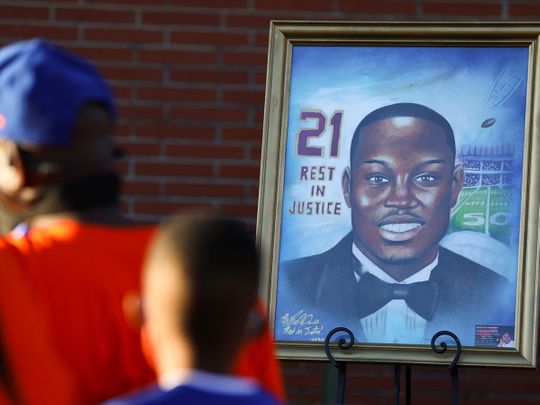
The three White men convicted of murder in the shooting death of Ahmaud Arbery while he jogged through their quiet Georgia neighborhood almost two years ago should spend the rest of their lives behind bars without any chance of parole, his sister and parents said at a sentencing hearing.
Travis McMichael, his father Greg McMichael and their neighbor William "Roddie" Bryan murdered Arbery "in broad daylight" while he was "doing what he loved more than anything - running," his father Marcus Arbery told Georgia Superior Court Judge Timothy Walmsley on Friday.
"That's when he felt most alive, most free - and they took all that from him," Arbery said. "When I close my eyes, I see his execution in my mind, over and over. I'll see that for the rest of my life."
Walmsley is required by state law to give the men life behind bars, but could allow for the possibility of parole after 30 years. He will render a decision at the end of the sentencing hearing. Prosecutors chose not to pursue the death penalty.
A jury in November found the three guilty of multiple charges including felony murder following a two-week trial, which included video of the February 2020 shooting that was captured by Bryan on his cell phone, and evidence that Arbery had wandered through an unsecured home under construction while jogging through the neighborhood on previous occasions. Prosecutors said the 25-year-old was murdered "because he was a Black man running down the street," echoing a 911 call one of the defendants made.
Arbery's mother Wanda Cooper-Jones said the three men deserve the maximum sentence because they knew exactly what they were doing when they "chose to target my son" for running through their neighborhood.
"They chose to treat him differently than other people who frequently visited their community," she said. "And when they couldn't sufficiently scare him or intimate him, they killed him."
Arbery's sister, Jasmine, fought back tears as she described her brother's broad nose, his athletic build, his love of running outdoors and his dark skin "that glistened in the sunlight like gold."
"These are the qualities that made these men assume Ahmaud was a dangerous criminal and chase him with guns drawn," she said. He "looked like me and the people I love."
Racially Charged
Arbery's name became a rallying cry in the Black Lives Matter protests that swept the U.S. in 2020 after the murder of George Floyd a few months later by a White police officer in Minneapolis. In both cases, viral video of the killings followed by delayed arrests prompted public outrage.
Lawyers for the three killers had argued that Arbery, who was unarmed, was shot in self-defense after he resisted the men's attempt to carry out a citizen's arrest under state law. But prosecutors argued successfully that the defense was untenable because it was the three defendants who initiated the conflict.
Travis McMichael fired three blasts from a shotgun in a struggle with Arbery after a five-minute chase, while Greg McMichael joined his son in the pursuit. Bryan, their neighbor, helped trap Arbery with his vehicle. Travis McMichael made the surprise decision to testify, telling the jury of 11 White people and one Black person that he fired because he was afraid Arbery would grab the gun from him and use it against him.
The racially charged case of Arbery's killers included evidence of how neighbors responded to reports on social media that a Black man had been seen in the area, repeatedly entering the site of a home under construction.
Nothing Taken
At the time of the shooting, none of the men had any evidence that Arbery had broken any law or taken anything from the construction site. The owner of the construction site testified that Arbery had never taken anything, and video cameras on the site captured several people in the area - including White people - also exploring the site without permission.
A state investigator testified earlier in the case that Bryan told him Travis McMichael had used a racial slur while standing over Arbery's body, and that evidence existed that he'd used racial slurs numerous times on social media. The three men also failed to offer Arbery medical aid after he was shot.
The judge had denied numerous requests for a mistrial, including one by a defense attorney who argued that the case should be tossed out because Al Sharpton, Jesse Jackson and Martin Luther King III had joined hundreds of Black pastors in protest at the courthouse, calling it an attempt to sway the jury.
The case highlighted problems in the criminal justice system from the start. Former Brunswick Judicial Circuit District Attorney Jackie Johnson, who initially handled the Arbery case, was indicted on charges of violating her oath of office and obstructing police in the matter. Greg McMichael worked for Johnson's office as an investigator until 2019, and left a voice mail asking her for advice after the shooting. Charges against the men weren't brought until months later, when the Cobb County District Attorney's office took the case.
The McMichaels and Bryan also face federal charges for hate crimes and attempted kidnapping in Arbery's death.












